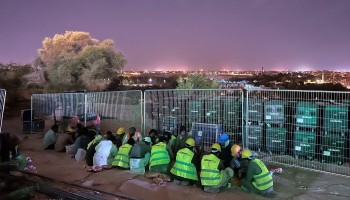Reported by
Migrant workers who built Saudi Arabia’s decade-long Riyadh metro project were paid paltry wages and trapped under the restrictive Kafala sponsorship system, leaving them vulnerable to unsafe and abusive working conditions, according to a new Amnesty International report.
The 42-page report documents exploitation endured by migrant workers from Bangladesh, India and Nepal while constructing the 176-kilometer metro system. Based on testimonies from 38 workers employed by a range of Saudi and foreign companies, it lays out the full extent of the mistreatment they faced.
Amnesty found that abuse began even before workers left their home countries, where recruiters charged fees of $700 to $3,500, pushing many into debt. Once in Saudi Arabia, wages varied widely. Most workers in junior roles earned as little as 1,000 Saudi riyals ($266) per month, while some early hires said they initially made just 700–800 riyals ($186–213) and needed years to reach higher pay.
Workers also reported employers confiscated their passports and housed them in “overcrowded and unsanitary” accommodations.
Working conditions were described as brutal. Workers said the construction site was “hell,” with temperatures frequently exceeding 40°C for more than eight hours a day during the summer months.
“The foremen and engineers would force us to work overtime even in hot temperatures. We would say, ‘We can’t. It’s extremely hot.’ But they would say, ‘keep working,’” an Indian worker named Janak told Amnesty.
Amnesty said such alleged abuse is enabled by the Kafala system, which governs the legal status of more than 13 million migrant workers in Saudi Arabia and ties a worker’s residency and job mobility to their employer. Despite “limited reforms”—including changes allowing workers to request exit or re-entry without employer approval—the organization found the system “continues to grant employers excessive control over foreign workers’ legal status, job mobility, and freedom to exit the country.”
Without meaningful action or real reforms, workers on Saudi Arabia’s megaprojects will continue to face systematic, state-sanctioned abuse—mistreatment that, in some cases, has proved deadly. In May, Human Rights Watch detailed how migrant laborers were killed by electrocution, decapitation and falls while working in hazardous conditions on construction sites for the kingdom’s “giga-projects,” including infrastructure for the 2034 FIFA Men’s World Cup.
“For companies operating in or entering Saudi Arabia, these findings should serve as a clear warning: comprehensive human rights due diligence is not optional,” said Marta Schaaf, Program Director for Climate, Economic Social Justice and Corporate Accountability at Amnesty International. “Without robust processes in place early on and an adequate plan to address any human rights concerns, businesses risk being directly linked or contributing to systematic labour abuses.”






